Genetics of Autism Spectrum Disorders
Unraveling the genetics of autism spectrum disorders. Explore the origins and implications of genetic clues in this insightful investigation.

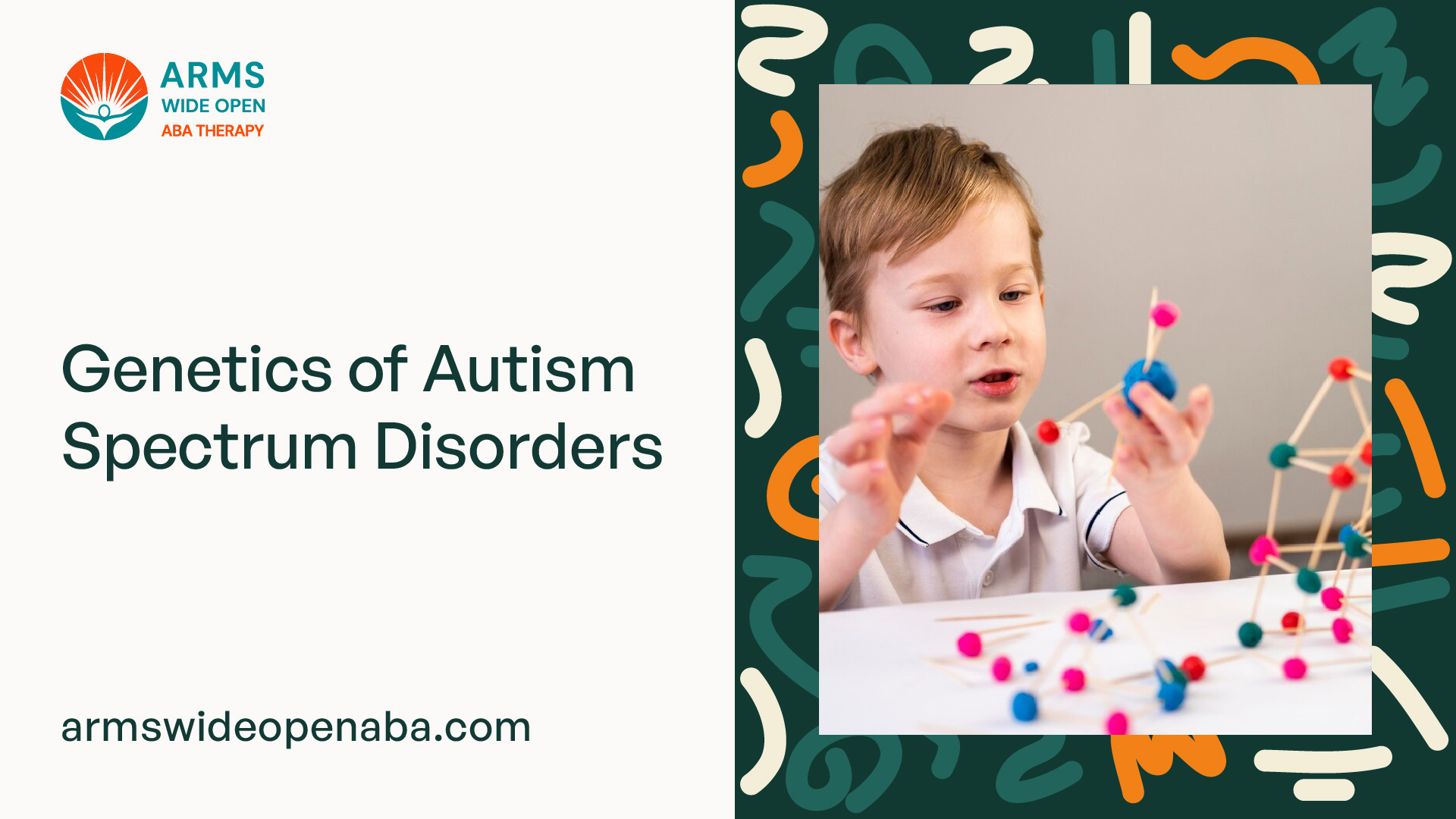
Understanding Autism Spectrum Disorders
Autism Spectrum Disorders (ASDs) are a group of neurodevelopmental conditions characterized by challenges in social interaction, communication, and repetitive behaviors. They are considered a complex and heterogeneous set of disorders, with a wide range of symptoms and severity levels.
What are Autism Spectrum Disorders?
Autism Spectrum Disorders encompass a range of conditions, including autism, Asperger's syndrome, and pervasive developmental disorder-not otherwise specified (PDD-NOS). These conditions are often collectively referred to as ASDs due to their shared characteristics.
Individuals with ASDs may have difficulties with social interactions, such as understanding and responding to social cues, initiating and maintaining conversations, and developing friendships. They may also display restricted and repetitive patterns of behavior, interests, or activities, which can manifest in various ways.
It's important to note that autism is a spectrum disorder, meaning that individuals with ASDs can exhibit a wide range of abilities and challenges. Some individuals may require significant support, while others may function independently with minimal assistance. The severity and presentation of symptoms can vary greatly from person to person.
Importance of Studying the Genetics of Autism
Studying the genetics of Autism Spectrum Disorders is crucial for gaining a deeper understanding of the underlying causes of these conditions. Research has shown that genetic factors play a significant role in the development of ASDs, contributing to their heritability.
By investigating the genetics of autism, scientists aim to identify specific genes and genetic variations that are associated with an increased risk of developing ASDs. This knowledge can help unravel the biological mechanisms involved in the development of autism and provide insights into potential therapeutic targets.
Understanding the genetic basis of autism also has important implications for early diagnosis and intervention. Genetic testing can help identify individuals at risk for autism or those who have certain genetic variations associated with the condition. This information can aid in early intervention strategies, allowing for tailored support and therapies to be implemented at an early age.
Moreover, studying the genetics of autism can contribute to the development of personalized treatments and interventions. By identifying specific genetic markers or variations, researchers can potentially develop targeted therapies that address the underlying genetic causes of ASDs.
Through ongoing research and advancements in the field of genetics, we can continue to deepen our understanding of Autism Spectrum Disorders, leading to improved diagnostic tools, effective interventions, and enhanced support for individuals and families affected by these conditions.
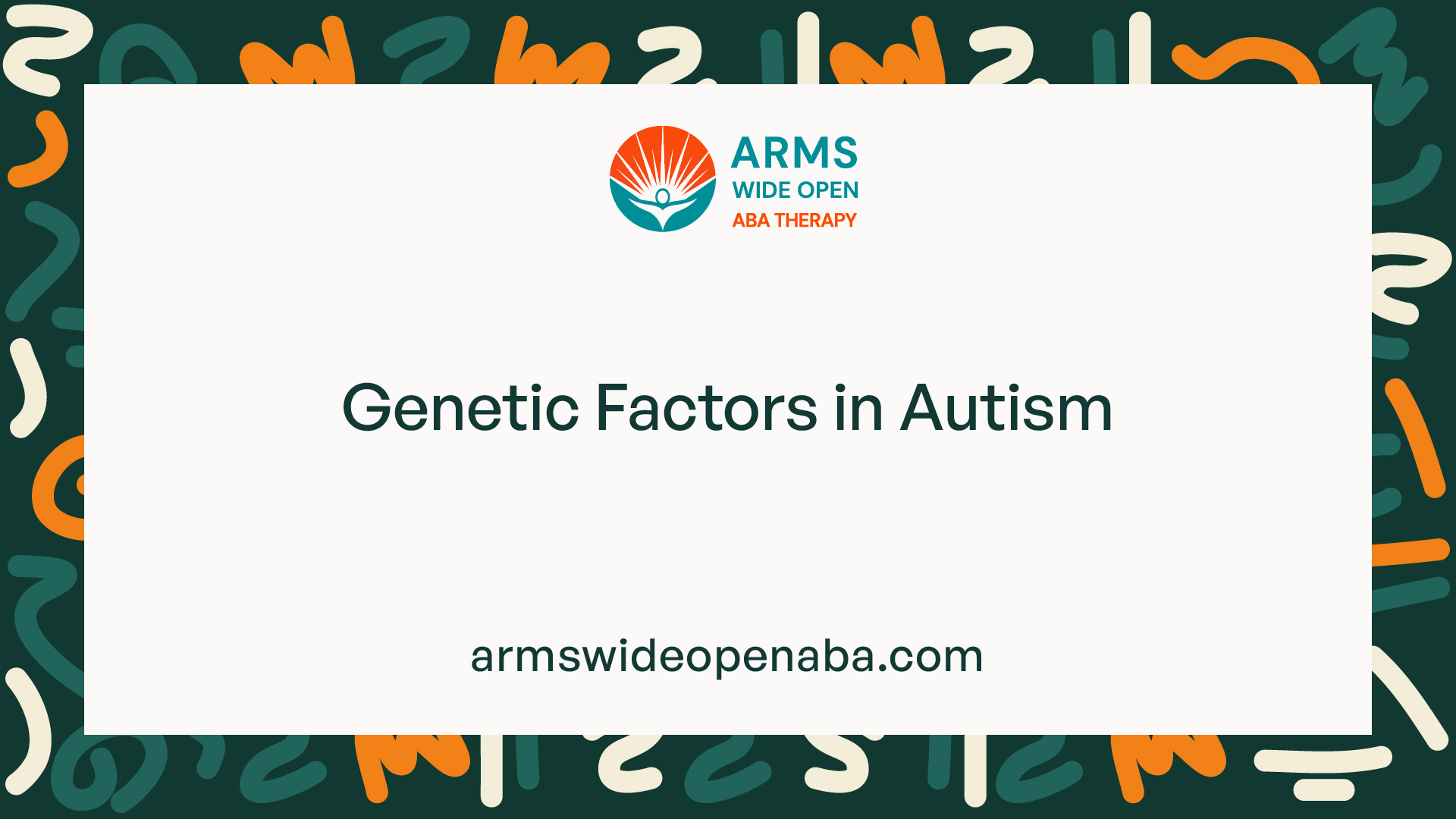
Genetic Factors in Autism
Understanding the role of genetics in autism spectrum disorders is crucial in unraveling the complex nature of this condition. Researchers have made significant progress in identifying genetic factors that contribute to the development of autism. In this section, we will explore the role of genetics in autism spectrum disorders and discuss some of the genetic variations associated with this condition.
Role of Genetics in Autism Spectrum Disorders
Genetics plays a significant role in the development of autism spectrum disorders (ASD). Studies have shown that there is a strong genetic component to ASD, with heritability estimates ranging from 50% to 90%. This means that genetics plays a substantial role in determining an individual's susceptibility to developing autism.
Family and twin studies have provided valuable insights into the heritability of autism. It has been observed that siblings of individuals with autism have a higher risk of also being affected by the disorder compared to the general population. Additionally, identical twins, who share the same genetic material, are more likely to both have autism compared to fraternal twins.
Genetic Variations Associated with Autism
Numerous genetic variations have been linked to autism spectrum disorders. These variations can involve changes in the structure or function of specific genes, as well as alterations in the number of copies of certain genes. While each genetic variation may have a relatively low individual impact, the cumulative effect of multiple variations can contribute to the development of autism.
One well-known genetic variation associated with autism is a mutation in the gene called fragile X mental retardation 1 (FMR1). Mutations in this gene can result in fragile X syndrome, a condition characterized by intellectual disability and autism-like behaviors. Another example is mutations in the gene CNTNAP2, which have been associated with an increased risk of autism and language impairments.
In addition to these specific genes, researchers have identified several genomic regions that are associated with an increased risk of autism. These regions, known as copy number variants (CNVs), involve either deletions or duplications of segments of DNA. CNVs can disrupt the normal functioning of genes and contribute to the development of autism.
Understanding the genetic variations associated with autism provides valuable insights into the underlying biological mechanisms of the disorder. It also highlights the heterogeneity of autism, as different individuals may have distinct genetic profiles. Further research is needed to fully elucidate the complex genetic landscape of autism spectrum disorders and its implications for diagnosis, treatment, and support.

The genetic factors involved in autism spectrum disorders are multifaceted and continue to be an area of active research. By unraveling the genetic clues, we can gain a deeper understanding of the underlying causes of autism and pave the way for more targeted approaches to diagnosis and intervention.
Investigating Genetic Clues
To gain a deeper understanding of the genetic factors contributing to autism spectrum disorders (ASD), scientists employ various research methods to investigate the intricate relationship between genetics and ASD. Through these methods, researchers aim to identify genetic markers that may play a role in the development of ASD.
Research Methods in Studying Autism Genetics
Studying the genetics of autism involves the use of several research methods to uncover potential genetic factors associated with ASD. Here are some common research methods used in this field:
- Family Studies: Family studies involve examining families with one or more individuals diagnosed with ASD. By comparing the occurrence of ASD among family members, researchers can determine whether genetic factors contribute to the disorder. These studies may also assess the heritability of autism, which is the extent to which genetic factors influence the development of the disorder.
- Twin Studies: Twin studies provide valuable insights into the genetic basis of autism. Researchers compare the concordance rates of ASD between identical (monozygotic) twins, who share 100% of their genetic material, and fraternal (dizygotic) twins, who share approximately 50% of their genetic material. Higher concordance rates among identical twins compared to fraternal twins suggest a strong genetic influence on ASD.
- Genome-Wide Association Studies (GWAS): GWAS involves analyzing the entire genome of individuals with ASD and comparing it to a control group without the disorder. This approach helps identify common genetic variations, known as single nucleotide polymorphisms (SNPs), that may be associated with an increased risk of ASD. GWAS studies have identified several genetic loci that show a significant association with ASD.
Identifying Genetic Markers for Autism
Identifying specific genetic markers associated with ASD is a key focus of research in the field. These markers can provide valuable insights into the biological mechanisms underlying the disorder and potentially aid in early diagnosis and targeted interventions. Here are some notable genetic markers associated with ASD:
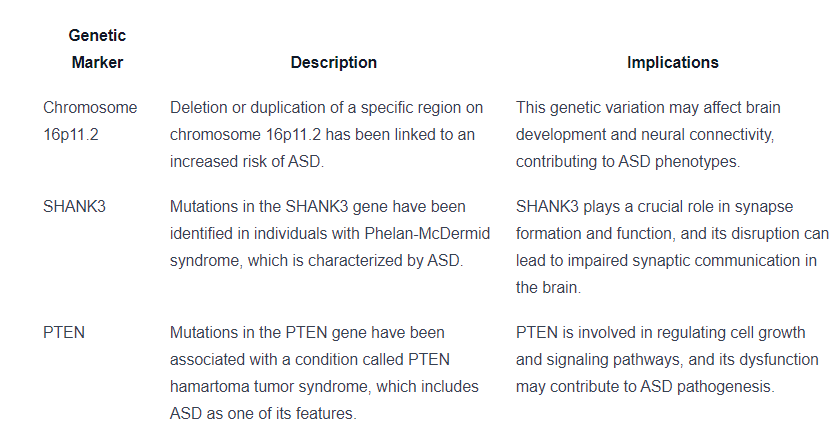
These genetic markers represent just a fraction of the extensive research being conducted to identify the genetic underpinnings of ASD. Continued investigation and advancements in research methods hold the promise of uncovering more genetic markers and unraveling the complex genetic landscape of autism spectrum disorders.
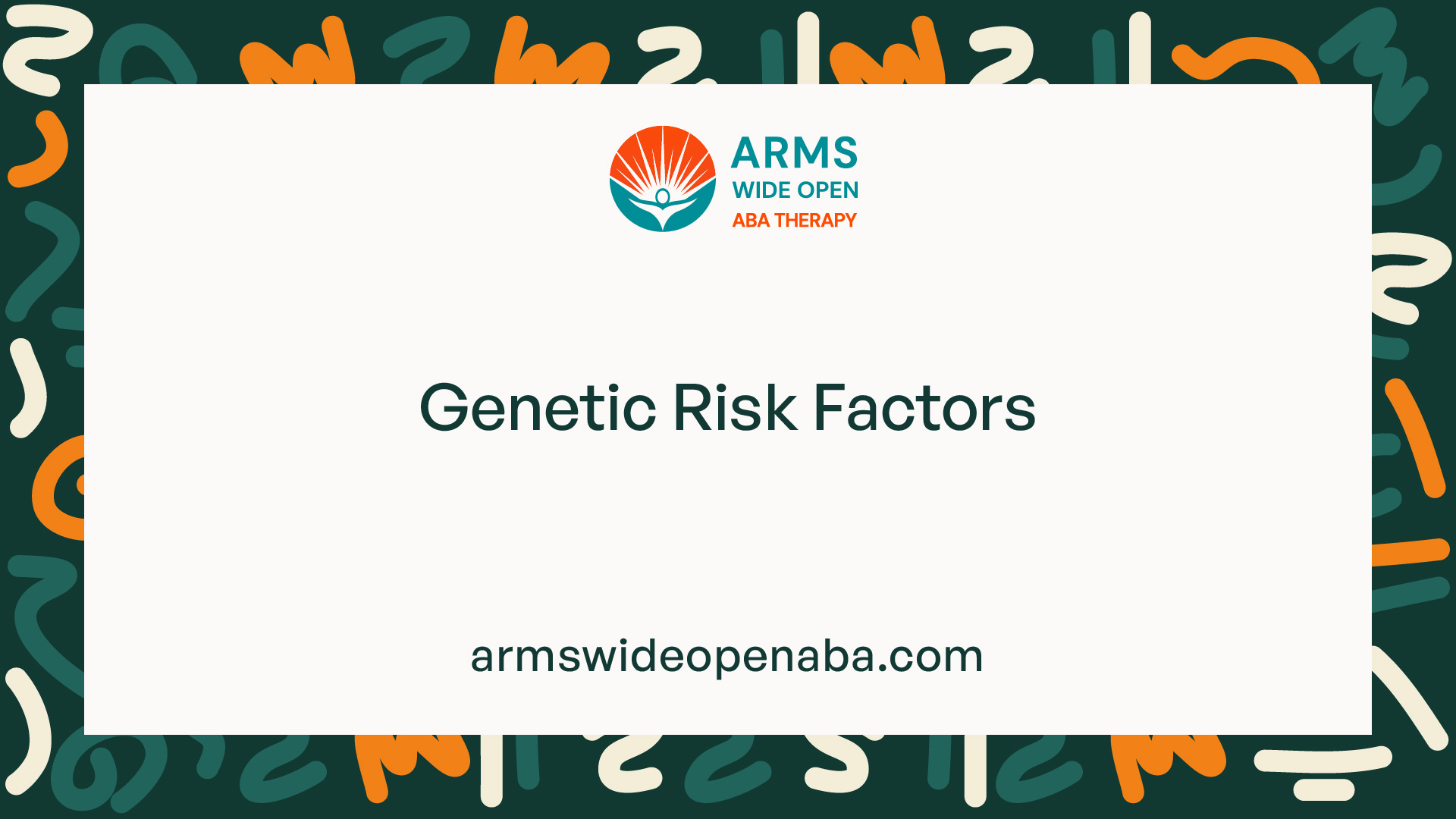
Genetic Risk Factors
When it comes to understanding the origins of Autism Spectrum Disorders (ASD), genetic factors play a significant role. Researchers have identified both common genetic risk factors and rare genetic variants that contribute to the development of ASD. Investigating these genetic clues can provide valuable insights into the underlying mechanisms of this complex disorder.
Common Genetic Risk Factors for Autism
Numerous studies have identified several common genetic risk factors associated with ASD. These risk factors involve variations in multiple genes, each contributing a small effect to the overall risk of developing autism. While no single gene is solely responsible for causing ASD, certain genetic variations increase the likelihood of developing the condition.
Research has shown that common genetic risk factors for ASD involve genes that are involved in brain development, neuronal signaling, and synapse formation. These genes play crucial roles in the proper functioning of the brain and are essential for communication between neurons.
Although the specific genes involved may differ among individuals with ASD, some of the common genetic risk factors identified include:
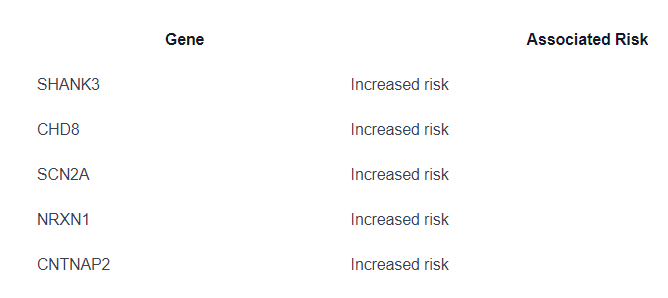
It's important to note that while these genetic variations increase the likelihood of developing ASD, they do not guarantee the development of the disorder. The interplay between genetic and environmental factors is complex and further research is needed to fully understand their interactions.
Rare Genetic Variants and Their Impact on Autism
In addition to common genetic risk factors, rare genetic variants have also been found to have a significant impact on the development of ASD. These variants involve changes in the DNA sequence that are not commonly found in the general population.
Rare genetic variants can occur in a single gene or involve larger chromosomal rearrangements. They can disrupt normal brain development and affect various biological processes implicated in ASD.
Some of the rare genetic variants associated with ASD include:

These rare genetic variants are estimated to contribute to a small percentage of ASD cases. However, studying these variants provides valuable insights into the underlying genetic mechanisms and pathways involved in ASD.
By understanding both the common genetic risk factors and rare genetic variants associated with ASD, researchers can gain a better understanding of the complex genetic architecture of this disorder. This knowledge can pave the way for future advancements in diagnosis, treatment, and support for individuals with Autism Spectrum Disorders.
Genetic Testing for Autism
Genetic testing plays a crucial role in the diagnosis and understanding of autism spectrum disorders (ASD). By analyzing an individual's genetic makeup, healthcare professionals can gain valuable insights into the genetic factors that contribute to the development of ASD. In this section, we will explore the role of genetic testing in autism diagnosis and discuss its benefits and limitations.
The Role of Genetic Testing in Autism Diagnosis
Genetic testing is a valuable tool in the diagnostic process for autism spectrum disorders. It involves analyzing an individual's DNA to identify specific genetic variations or mutations that may be associated with ASD. The results of genetic testing can provide healthcare professionals with important information to aid in the diagnosis, treatment, and management of autism.
Genetic testing for autism can help in several ways:
- Risk Assessment: Genetic testing can determine if there are any known genetic risk factors associated with ASD. This information can help healthcare professionals understand the likelihood of an individual developing autism and provide appropriate counseling and support.
- Early Intervention: Early detection of genetic variations associated with autism can enable early intervention strategies that may improve outcomes for individuals with ASD. Identifying these genetic markers can guide healthcare professionals in tailoring interventions and therapies to address specific needs.
- Family Planning: Genetic testing can provide valuable information for families planning to have children. If a specific genetic variation associated with autism is identified in a parent, genetic counseling can help assess the risk of passing on the condition to future offspring.
It is important to note that genetic testing alone cannot diagnose autism spectrum disorders. The diagnosis of ASD is complex and typically involves a comprehensive evaluation by a multidisciplinary team, including assessments of behavioral and developmental characteristics.
Benefits and Limitations of Genetic Testing for Autism
Genetic testing offers several benefits in understanding the genetic basis of autism spectrum disorders. However, it also has its limitations. Let's explore both aspects:
Benefits of Genetic Testing for Autism:
- Personalized Approach: Genetic testing allows for a personalized approach to the diagnosis and management of autism. By identifying specific genetic variations, healthcare professionals can tailor interventions and therapies to the individual's unique needs.
- Family Support: Genetic testing can provide valuable information and support for families. Understanding the genetic basis of autism can help families connect with support networks, access resources, and make informed decisions about treatments and interventions.
- Research Advancements: Genetic testing contributes to ongoing research on autism spectrum disorders. By studying the genetic variations associated with ASD, researchers can gain insights into the underlying mechanisms of the condition, potentially leading to advancements in treatment and support.
Limitations of Genetic Testing for Autism:
- Incomplete Understanding: While genetic testing can identify specific genetic variations associated with autism, our understanding of the genetic complexities of ASD is still evolving. Many cases of autism are thought to have a multifactorial etiology, involving a combination of genetic and environmental factors.
- Limited Availability: Not all genetic variations associated with autism have been identified, and genetic testing may not be accessible or affordable for everyone. Additionally, the interpretation of genetic test results can be complex and requires the expertise of healthcare professionals well-versed in genetics.
- Ethical Considerations: Genetic testing raises ethical considerations, such as privacy concerns and potential stigmatization. It is important for individuals and families to fully understand the implications and potential limitations of genetic testing before pursuing it.
Genetic testing is a valuable tool in understanding the genetic underpinnings of autism spectrum disorders. It can provide important insights into the diagnosis, treatment, and support of individuals with ASD. However, it should always be used in conjunction with other diagnostic methods and with careful consideration of the benefits and limitations involved.
Future Perspectives
As research on the genetics of autism spectrum disorders (ASD) continues to advance, it opens up new possibilities for understanding and addressing this complex condition. In this section, we will explore some of the recent advances in genetic research on autism and discuss the potential implications for treatment and support.
Advances in Genetic Research on Autism
Recent years have witnessed significant progress in unraveling the genetic underpinnings of autism spectrum disorders. Technological advancements, such as the development of high-throughput sequencing techniques, have allowed researchers to delve deeper into the genetic complexities of ASD. This has led to the identification of various genes and genetic variations associated with the condition.
The discovery of these genetic clues has provided valuable insights into the biological mechanisms underlying ASD. It has shed light on the intricate interactions between genes, brain development, and the manifestation of autistic traits. By understanding the genetic factors involved, researchers are better equipped to explore targeted interventions and personalized treatments for individuals on the autism spectrum.
Potential Implications for Treatment and Support
The insights gained from genetic research on autism hold great potential for improving the treatment and support available to individuals with ASD. Here are some potential implications of these advancements:
- Early Intervention: Genetic testing and identification of specific genetic variations associated with ASD can enable early detection and intervention. Early diagnosis allows for timely access to intervention services, maximizing the potential for improved outcomes and quality of life.
- Targeted Therapies: Understanding the genetic basis of autism opens up the possibility of developing targeted therapies that address the specific molecular pathways affected by genetic variations. This personalized approach to treatment holds promise for more effective interventions tailored to individual needs.
- Precision Medicine: With a deeper understanding of the genetic factors influencing autism, the field of precision medicine can advance. Precision medicine aims to provide tailored treatments based on an individual's genetic profile, optimizing therapeutic outcomes and minimizing potential side effects.
- Genetic Counseling: Genetic research on autism can inform genetic counseling for families affected by ASD. Genetic counselors can provide information about the inheritance patterns, recurrence risks, and available testing options. This knowledge empowers families to make informed decisions regarding family planning and support services.
While these advancements offer great promise, it is important to note that translating genetic research findings into clinical applications takes time and extensive validation. Collaboration between researchers, clinicians, and other stakeholders is crucial to ensure that genetic discoveries are effectively translated into meaningful improvements in the lives of individuals with autism.
The future of genetic research on autism holds immense potential for enhancing our understanding of the condition and paving the way for more targeted and personalized approaches to treatment and support. As scientists continue to unravel the complex genetic landscape of ASD, it is hoped that these advancements will lead to improved outcomes and a better quality of life for individuals on the autism spectrum and their families.
Sources
https://emedicine.medscape.com/article/2024885-overview
https://medlineplus.gov/genetics/condition/autism-spectrum-disorder/
https://www.ncbi.nlm.nih.gov/pmc/articles/PMC3691066/
Similar articles
We’re here to help you

Our team is here to assist you in this process. Contact us for any assistance.
it’s easy to apply
We Accept Most Insurances
Our in-network insurance partnerships make ABA therapy more accessible to families throughout our service areas.







Our Insurance Process
We'll request your insurance details to help us verify your plan's coverage for ABA therapy. Once we've received this information, we'll walk you through your benefits, including copayments, deductibles and out-of-pocket maximums, so you know what to expect in advance.
Our team will then handle the preauthorization and all the necessary paperwork.
.svg)





















.jpeg)


































.jpeg)




.jpeg)







.jpeg)











.jpeg)
















